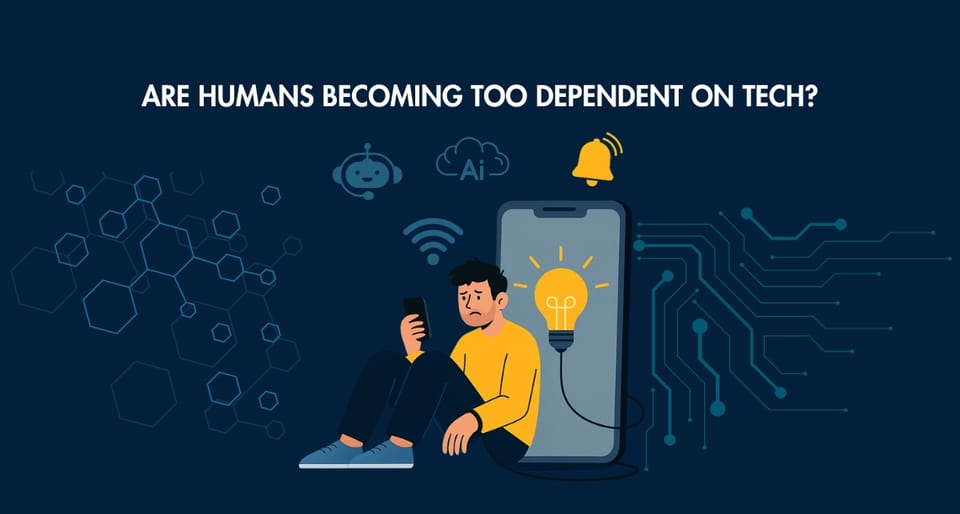Are Humans Becoming Too Dependent on Tech?

From Convenience to Co-dependence: A Deep Dive into Our Digital Dilemma
From the moment we wake up to the moment we sleep—sometimes even while we sleep—technology is intertwined with every aspect of our lives. We rely on apps to wake us up, maps to guide us, AI to write for us, and cloud backups to remember what we forget. The question isn’t “Are we using technology?”—the question now is: “Can we live without it?”
In an era of smart homes, AI assistants, wearable health trackers, and one-click groceries, the line between convenience and dependency is blurring. But is our growing dependence on tech making us smarter, or more helpless?
The Convenience Trap: How Tech Hooks Us
- Automation Overload
From turning on lights with voice commands to smart coffee makers, we’re outsourcing basic decision-making. The downside? Our problem-solving muscles might be atrophying. - Instant Gratification Culture
One-day delivery, binge-worthy streaming, food at your doorstep in 10 minutes. While it's efficient, it’s also reconditioning our patience and expectations. - Digital Memory Loss
Why remember birthdays, phone numbers, or directions when your phone remembers everything? Our brains are evolving around tech rather than with it.
The Psychological Toll
- Dopamine Loops & Tech Addiction
Social media, video games, and even email are designed to deliver small dopamine hits. This keeps us scrolling, liking, sharing—hooked. - FOMO & Anxiety
Always being connected means never truly switching off. Fear of missing out (FOMO), doomscrolling, and digital fatigue are real and rising. - AI Dependence
Generative AI tools like ChatGPT (yes, me!) are amazing for productivity. But are they reducing our need to think deeply or create from scratch?
Dependency in Critical Areas
- Healthcare
While wearables and diagnostic AIs help detect illness early, they can also cause paranoia and misdiagnosis if used blindly. - Education
Students use AI for assignments. Great for support, dangerous when it replaces original thought. - Navigation
GPS is a lifesaver—but many have lost the skill of reading maps or understanding cardinal directions. - Communication
Auto-replies, emoji-based chats, and voice notes have simplified expression. But are we losing the art of meaningful conversation?
The Flip Side: Empowerment, Not Enslavement
It’s not all doom and gloom. Technology has also:
- Enabled remote work and global collaboration.
- Provided accessibility for people with disabilities.
- Enhanced safety, speed, and accuracy across industries.
- Opened creative frontiers (think digital art, indie gaming, AI music).
The key is mindful usage—tech should be the tool, not the master.
The Red Flags: Signs You May Be Too Dependent
- Feeling anxious when your phone battery is low.
- Needing GPS for a route you've taken many times.
- Relying on spellcheck so much you forget how to spell.
- Having “phantom vibration syndrome”—feeling your phone buzz when it hasn’t.
So What Can We Do? – The Tech-Life Balance Checklist
✅ Digital Detox Days – Weekly no-phone time
✅ Manual Alternatives – Read maps, cook without YouTube, write by hand
✅ Limit Notifications – Cut out the noise
✅ Mindful AI Use – Use tools to assist, not replace your thinking
✅ Relearn Forgotten Skills – Mental math, memory games, face-to-face chats
Dependency or Evolution?
We’re not going back to the pre-digital age—but we can evolve mindfully. The real danger isn’t technology itself—it’s uncritical adoption. The future belongs not to those who reject tech, but to those who control it rather than be controlled by it.
So ask yourself: Are you the user... or the used?
Frequently Asked Questions (FAQ)
🔹 1. Is being dependent on technology necessarily a bad thing?
Not always. Tech dependency can lead to greater productivity, better healthcare, and easier communication. The problem arises when it begins to erode critical thinking, memory, patience, or social skills. The goal is balanced use, not total avoidance.
🔹 2. What are the signs of unhealthy tech dependence in daily life?
Some red flags include:
- Feeling anxious when away from your phone
- Using GPS for familiar routes
- Struggling to focus without background noise
- Checking your phone first and last thing every day
- Using AI or apps even for basic tasks
🔹 3. Has technology affected our ability to think independently?
Yes, in some ways. Over-reliance on search engines, autocorrect, and generative AI can reduce our engagement in problem-solving, creativity, and original thought. We risk becoming passive consumers rather than active thinkers.
🔹 4. Are younger generations more dependent on technology?
Yes—digital natives often grow up surrounded by tech, so it's more deeply embedded in their habits. However, with the right digital literacy education and boundaries, they can also be the most mindful users of technology.
🔹 5. How can I reduce my tech dependence without compromising convenience?
Here are a few small but effective steps:
- Designate tech-free hours daily
- Use physical notebooks for to-dos or journaling
- Switch to manual tools occasionally (e.g., calculators, cookbooks)
- Walk without GPS to train your memory
- Disable unnecessary notifications
🔹 6. Is using AI tools like ChatGPT making people lazy?
Not inherently. AI tools should be seen as assistants—not replacements. When used thoughtfully, they can enhance productivity, brainstorming, and research. The key is to complement human thinking, not replace it.
🔹 7. What is digital minimalism?
Digital minimalism is a lifestyle philosophy that encourages using tech intentionally. Instead of letting tech dictate your life, you choose what to use, when, and why—based on your values and goals.
🔹 8. Will tech dependence increase in the future?
Most likely. As AI, automation, and wearable tech evolve, convenience will increase. But awareness is also rising—leading many people and organizations to rethink and regulate their tech usage.
🔹 9. Can technology help reduce its own overuse?
Ironically, yes. There are plenty of apps and tools for:
- Screen-time tracking
- Focus & productivity (like Pomodoro timers)
- Sleep tracking & digital detox reminders
- Notification control and social media limits
🔹 10. What’s the ultimate takeaway from this blog?
Technology isn’t the enemy—mindless usage is. We should aim to use tech to enhance our lives, not control them. Dependency becomes dangerous only when it replaces essential human experiences, emotions, and skills.






Member discussion